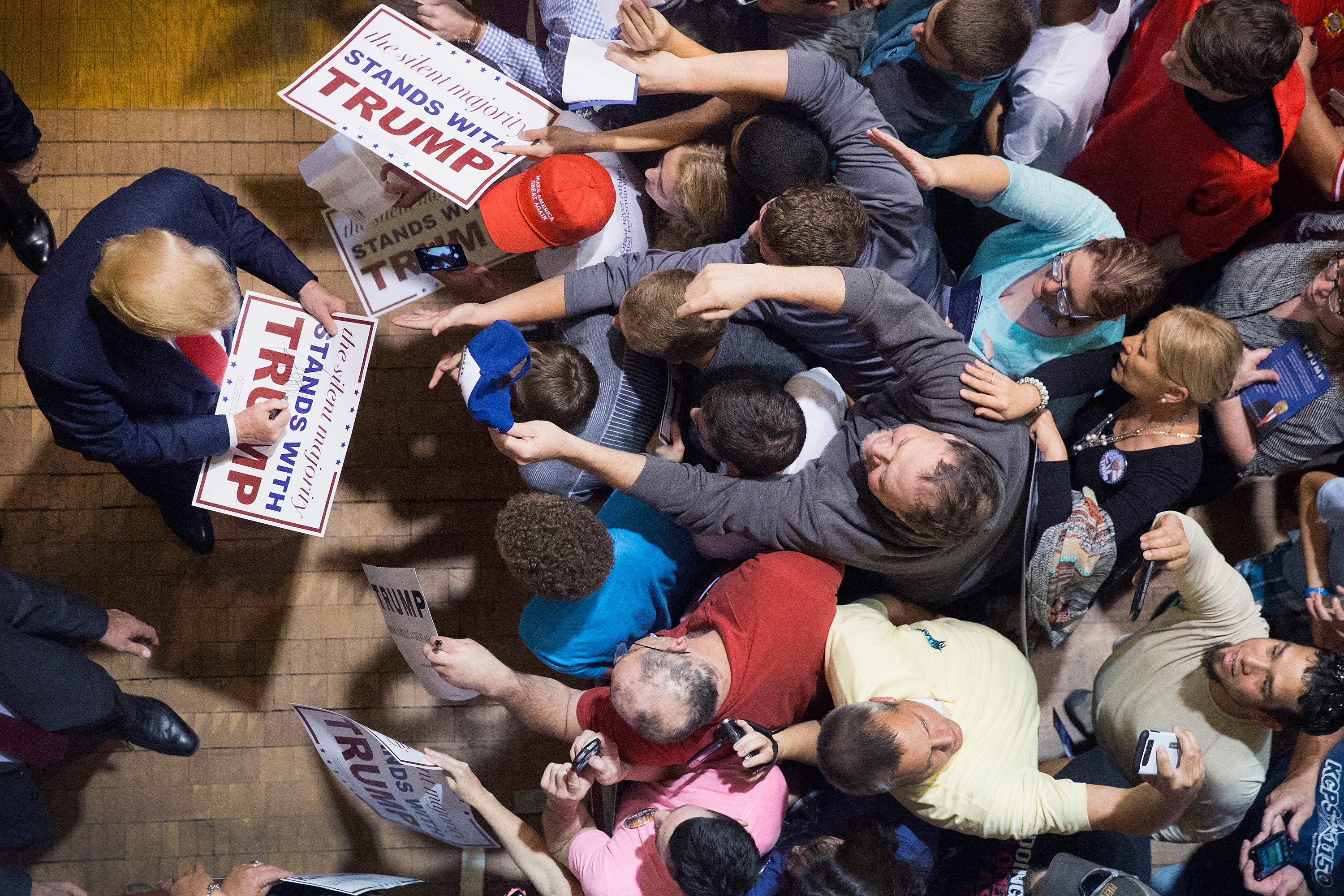How Trumpism hid in plain sight for 15 years
If you want to understand the rise of Donald Trump, just look to conservative literature


The rise of Donald Trump baffled many Republicans. His appeal to the part of the Republican Party that GOP leaders treat with kitchen gloves and a face mask — the voters that poke and prod candidates to death with their ever more stringent question: "Is he a conservative? A true conservative?" — seemed inexplicable. And how could a campaign run on the same nationalist themes that animated the unsuccessful Pat Buchanan campaign 20 years ago suddenly have so much force and life? Instead of talking about the interest of job-creators, the presumptive Republican nominee is talking about interest in jobs, full stop. Instead of castigating 47 percent of the country as "takers," he is advertising his paternalistic instincts to "take care" of the nation's people. The party that fought unions to pass NAFTA now is led by a free-trade skeptic.
What happened?
There are a lot of answers. First, there's always been a large section of the Republican Party that had very little knowledge or interest in conservative ideas and ideology. Second, the dropping financial and psychological costs of migration for the migrants themselves mean that questions about immigration, membership in society, and borders will begin to re-order politics around the globe in the same the way trade and open sea lanes reoriented them during the industrial revolution. Third, it did always seem odd that American politics did not have a more nationalist edge, which one analyst back in the Buchanan campaign believed could change American politics.
The Week
Escape your echo chamber. Get the facts behind the news, plus analysis from multiple perspectives.

Sign up for The Week's Free Newsletters
From our morning news briefing to a weekly Good News Newsletter, get the best of The Week delivered directly to your inbox.
From our morning news briefing to a weekly Good News Newsletter, get the best of The Week delivered directly to your inbox.
But perhaps American nationalism wasn't hidden away after Buchanan wore a hard-hat in New Hampshire. In fact, looking back, there were signs everywhere of it getting ready to burst out.
Just look at conservative literature. Ann Coulter's immigration-restrictionist book Adios America has been credited with altering American politics after it crossed by Donald Trump's eyes. But it had precursors.
During the Bush years, a diverse group of right-leaning writers and thinkers began sounding an alarm about what mass immigration meant for the rest of the country. Many of them emerged from California, exactly where migration's transformational effects were first known. They remembered the 1960s and '70s version of the state, when it seemed like an egalitarian and middle-class utopia, each family in a pleasant bungalow and a school system that was the envy of the world. This paradise was upended by mass immigration and galloping inequalities. And its inheritors were hungry for someone, anyone, to put into words what they were feeling.
Along came Victor David Hanson and his 2003 book Mexifornia: A State of Becoming, which posited that Mexicans fled the dysfunctional statism of Mexico but ended up recreating it in California. Another California writer, Steve Sailer, wrote blog items and articles that seemed to exercise a kind of subliminal influence across much of the right in that decade. One could detect his influence even in the places where his controversial writing on race was decidedly unwelcome. Another Californian writer, Mickey Kaus, became one of the few centrist to liberal-leaning opponents of lax immigration.
A free daily email with the biggest news stories of the day – and the best features from TheWeek.com
There were also national pundits like Michelle Malkin, who put a national security spin on the issue in her 2002 book Invasion: How America Still Welcomes Terrorists, Criminals, And Other Foreign Menaces To Our Shores. And there were policy wonks like Mark Krikorian, who is president for the Center for Immigration Studies and wrote The New Case Against Immigration Both Legal and Illegal in 2006.
Popular political titles like these found a large, hungry audience — and upended national politics. They drove conservative activists to shut down the congressional switchboards when President Bush tried to pass comprehensive immigration reform in his second term. They drove the founding of the militia group the Minutemen. And they drove the somewhat radical congressional candidacy of Randy Graf in Arizona.
The truth was, the great wave of migration America experienced from the early '90s to the middle of last decade was a history-shaping event with long-term consequences. But because it was hardly debated by official Washington, the passions it generated tended to find sensationalistic or conspiratorial outlets.
And immigration went hand in hand with anxiety about American jobs and sovereignty. There was a minor nationalist panic during the Bush presidency, with conspiracies floating around that North American governments would create a common currency, the Amero, in imitation of the European Union. Pictures of the currency still float around the internet today. They came with the theory that America would stave off bankruptcy by uniting itself with Canada's natural resources and Mexico's underpaid labor. With that done, an enormous new transportation network would spread across the map like a squid, the NAFTA superhighway system. The rumors were fueled by quixotic lobbying dreams. But the opposition was real and fierce, and it eventually took down the very real Trans-Texas Corridor project with it.
In other words, there were signs of an emerging Trumpism on the right for years. These political tremors were ignored during the Bush years as the GOP immolated itself on foreign policy. And so no one wanted to believe an earthquake like this was coming.
Editor's note: A previous version of this article misstated a book's publication date. It has since been corrected. We regret the error.
Michael Brendan Dougherty is senior correspondent at TheWeek.com. He is the founder and editor of The Slurve, a newsletter about baseball. His work has appeared in The New York Times Magazine, ESPN Magazine, Slate and The American Conservative.
-
 How to rekindle a reading habit
How to rekindle a reading habitThe Week Recommends Fall in love with reading again, or start a brand new relationship with it
-
 Political cartoons for January 8
Political cartoons for January 8Cartoons Thursday’s political cartoons include a well-done steak, a silenced protester, and more
-
 US nabs ‘shadow’ tanker claimed by Russia
US nabs ‘shadow’ tanker claimed by RussiaSpeed Read The ship was one of two vessels seized by the US military
-
 The billionaires’ wealth tax: a catastrophe for California?
The billionaires’ wealth tax: a catastrophe for California?Talking Point Peter Thiel and Larry Page preparing to change state residency
-
 Bari Weiss’ ‘60 Minutes’ scandal is about more than one report
Bari Weiss’ ‘60 Minutes’ scandal is about more than one reportIN THE SPOTLIGHT By blocking an approved segment on a controversial prison holding US deportees in El Salvador, the editor-in-chief of CBS News has become the main story
-
 Has Zohran Mamdani shown the Democrats how to win again?
Has Zohran Mamdani shown the Democrats how to win again?Today’s Big Question New York City mayoral election touted as victory for left-wing populists but moderate centrist wins elsewhere present more complex path for Democratic Party
-
 Millions turn out for anti-Trump ‘No Kings’ rallies
Millions turn out for anti-Trump ‘No Kings’ ralliesSpeed Read An estimated 7 million people participated, 2 million more than at the first ‘No Kings’ protest in June
-
 Ghislaine Maxwell: angling for a Trump pardon
Ghislaine Maxwell: angling for a Trump pardonTalking Point Convicted sex trafficker's testimony could shed new light on president's links to Jeffrey Epstein
-
 The last words and final moments of 40 presidents
The last words and final moments of 40 presidentsThe Explainer Some are eloquent quotes worthy of the holders of the highest office in the nation, and others... aren't
-
 The JFK files: the truth at last?
The JFK files: the truth at last?In The Spotlight More than 64,000 previously classified documents relating the 1963 assassination of John F. Kennedy have been released by the Trump administration
-
 'Seriously, not literally': how should the world take Donald Trump?
'Seriously, not literally': how should the world take Donald Trump?Today's big question White House rhetoric and reality look likely to become increasingly blurred
